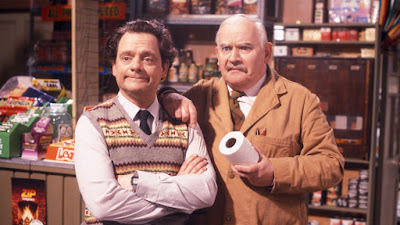As we grind through the exit
payment, the transitional arrangements and edge towards a final trade treaty,
the Brexit negotiations have wearied, worried and depressed us at their various
stages. Yet we will be an independent nation once again on 29 March 2019 and
will be free of any intrusive EU controls by 31 December 2020. That is a great
prize even though we may be rather poorer for a period. We will rebuild our
international relationships in an outward- looking and positive spirit,
confident that our people can adapt and mightily flourish. We should be
immensely re-invigorated by this prospect as we have plenty going for us as a
nation and as an economy.
 |
| David Davis and Michel Barnier slug it out |
Although the negotiations have been
and will continue to be frustrating, with a little bit of mutual goodwill, they
should be concluded with a sensible agreement protecting the integrity of the
EC and recognising the importance of the services industry to the UK. The Irish
border and the status of Gibraltar are knotty problems but quite capable of
resolution while noisy and emotive uproar about the control of fish quotas
should be relegated to the petty side-lines.
The Britain our children will
inherit must rank highly among the nations of the world. Historically
distinguished and influential, the UK’s constitutional monarchy system is
popular as long as the revered Queen lives – expect some turmoil when graceless
Charles and Camilla succeed. The crucial parliamentary institutions function
efficiently, though representative reform of the Lords is overdue - wise heads
are required so we do not throw out the baby with the bath-water. Democracy is
dutifully respected with no need for stuffed ballot boxes à
la Russe!
The security of our people, the
integrity of our borders and the resources to defend them are foremost priorities
among the duties of any UK government. Threats to our people have emerged from
the recent Russian release of nerve agent in Salisbury and the slack open-door
policy of the EU regarding illegal immigration has focused attention on the
threat from porous borders in Eastern and Mediterranean Europe. Our ability to
work with Europe has been underlined by the gratifying recent solidarity
displayed by the EU and others in respect of Russian aggression towards the UK.
British military punch is in European terms formidable, if under-funded, and
our naval capabilities will revive as our two carriers are gradually brought
into service. New threats from cyberspace are countered by our large national investment
in GCHQ.
Domestically there is naturally a
string of issues bearing down upon us. The North-South divide receives
increasing attention – major investment in new energy sources, shale and
wind-power, would be helpful there. Improving state education standards is a
great challenge as a smarter and more productive workforce will be a
post-Brexit necessity. The much-cherished, taxpayer-funded but costly National
Health Service managed to weather a hard winter without collapse and fresh
thinking is in train on extra ways to finance it. But it remains a uniquely
appreciated national asset dispensing healthcare to the entire population free
at the point of need. The US should have its own version – 70 years late.
Academic excellence attracts
students from across the globe with Oxford and Cambridge Universities ranking
respectively 1st and 2nd globally with Imperial, London, in 8th
place, a tremendous achievement. No other EU institutions appear in the top 10.
Many UK secondary schools, state and private, are widely admired with fierce
international competition for places. The UK’s inventiveness is exemplified by
the numerous Nobel prizes she still earns for scientific research and her
constant investment in new industries. Our lively cultural life, not just in
London, matches the best elsewhere. Perhaps most comforting of all, the rule of
law holds sway and the courts are scrupulously just. The influencing or even
bribery of judges, commonplace in far too many other nations, is almost
unthinkable in the UK. Our police improve rapidly in their investigation of
crime, making the UK safer than most comparable countries like the US, France
and Germany.
Our current economy is biased
towards the service sector with leadership in financial services, legal and
accountancy expertise, insurance and shipping especially apparent in the City
of London, a jewel in the crown. I had a career there and know the astonishing
depth of competence available. The EU will do all it can to damage this asset
but Frankfurt, Paris and Amsterdam are not a patch on London.
 |
| The priceless City of London |
My readers may be puzzled by my parade of the merits of the UK. The reason is that for far too long we have been debating Brexit and the future of the UK on the back foot, enduring a constant drip-drip of poison from Establishment figures and motley Remainers, supported by a noisily hostile media. The BBC and the Bank of England have shown no robust confidence in their own country to their lasting shame and the pronouncements and prophecies of leading Remainers have had the integrity of the actions of an Australian Test Cricket Captain.
Flag-waving aside, the UK is a
fine nation by every standard, not to be disparaged by any and ready and
willing to enter into friendly international relations with all, once the EU
restraints are finally ended. This is a fine inheritance to pass down to our
children.
 |
| The Royal Standard of the UK |
SMD
30.03.18
Text Copyright ©
Sidney Donald 2018











